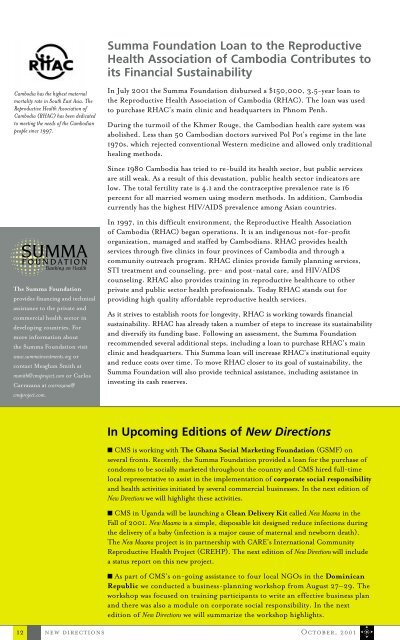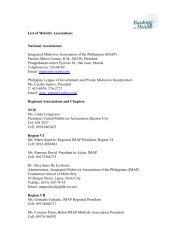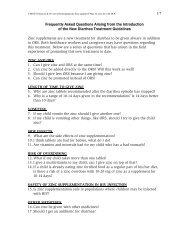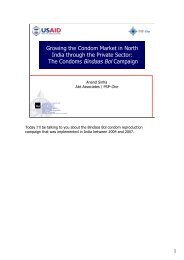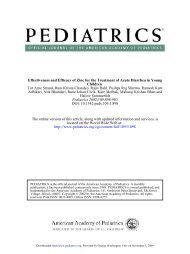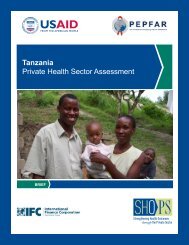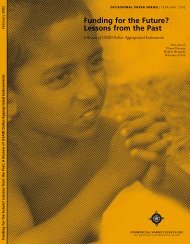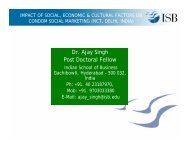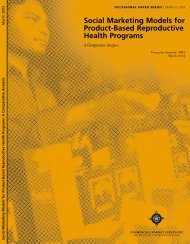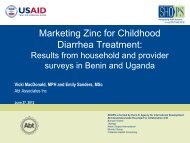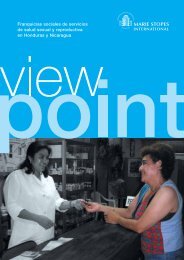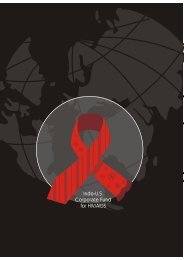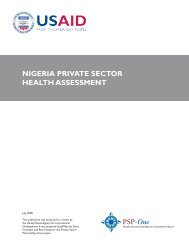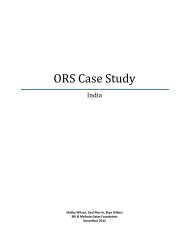new directions - (SHOPS) project
new directions - (SHOPS) project
new directions - (SHOPS) project
Create successful ePaper yourself
Turn your PDF publications into a flip-book with our unique Google optimized e-Paper software.
Summa Foundation Loan to the Reproductive<br />
Health Association of Cambodia Contributes to<br />
its Financial Sustainability<br />
Cambodia has the highest maternal<br />
mortality rate in South East Asia. The<br />
Reproductive Health Association of<br />
Cambodia (RHAC) has been dedicated<br />
to meeting the needs of the Cambodian<br />
people since 1997.<br />
The Summa Foundation<br />
provides financing and technical<br />
assistance to the private and<br />
commercial health sector in<br />
developing countries. For<br />
more information about<br />
the Summa Foundation visit<br />
www.summainvestments.org or<br />
contact Meaghan Smith at<br />
msmith@cms<strong>project</strong>.com or Carlos<br />
Carrazana at ccarrazana@<br />
cms<strong>project</strong>.com.<br />
In July 2001 the Summa Foundation disbursed a $150,000, 3.5-year loan to<br />
the Reproductive Health Association of Cambodia (RHAC). The loan was used<br />
to purchase RHAC’s main clinic and headquarters in Phnom Penh.<br />
During the turmoil of the Khmer Rouge, the Cambodian health care system was<br />
abolished. Less than 50 Cambodian doctors survived Pol Pot’s regime in the late<br />
1970s, which rejected conventional Western medicine and allowed only traditional<br />
healing methods.<br />
Since 1980 Cambodia has tried to re-build its health sector, but public services<br />
are still weak. As a result of this devastation, public health sector indicators are<br />
low. The total fertility rate is 4.1 and the contraceptive prevalence rate is 16<br />
percent for all married women using modern methods. In addition, Cambodia<br />
currently has the highest HIV/AIDS prevalence among Asian countries.<br />
In 1997, in this difficult environment, the Reproductive Health Association<br />
of Cambodia (RHAC) began operations. It is an indigenous not-for-profit<br />
organization, managed and staffed by Cambodians. RHAC provides health<br />
services through five clinics in four provinces of Cambodia and through a<br />
community outreach program. RHAC clinics provide family planning services,<br />
STI treatment and counseling, pre- and post-natal care, and HIV/AIDS<br />
counseling. RHAC also provides training in reproductive healthcare to other<br />
private and public sector health professionals. Today RHAC stands out for<br />
providing high quality affordable reproductive health services.<br />
As it strives to establish roots for longevity, RHAC is working towards financial<br />
sustainability. RHAC has already taken a number of steps to increase its sustainability<br />
and diversify its funding base. Following an assessment, the Summa Foundation<br />
recommended several additional steps, including a loan to purchase RHAC’s main<br />
clinic and headquarters. This Summa loan will increase RHAC’s institutional equity<br />
and reduce costs over time. To move RHAC closer to its goal of sustainability, the<br />
Summa Foundation will also provide technical assistance, including assistance in<br />
investing its cash reserves.<br />
12<br />
<strong>new</strong> <strong>directions</strong><br />
In Upcoming Editions of New Directions<br />
■ CMS is working with The Ghana Social Marketing Foundation (GSMF) on<br />
several fronts. Recently, the Summa Foundation provided a loan for the purchase of<br />
condoms to be socially marketed throughout the country and CMS hired full-time<br />
local representative to assist in the implementation of corporate social responsibility<br />
and health activities initiated by several commercial businesses. In the next edition of<br />
New Directions we will highlight these activities.<br />
■ CMS in Uganda will be launching a Clean Delivery Kit called New Maama in the<br />
Fall of 2001. New Maama is a simple, disposable kit designed reduce infections during<br />
the delivery of a baby (infection is a major cause of maternal and <strong>new</strong>born death).<br />
The New Maama <strong>project</strong> is in partnership with CARE’s International Community<br />
Reproductive Health Project (CREHP). The next edition of New Directions will include<br />
a status report on this <strong>new</strong> <strong>project</strong>.<br />
■ As part of CMS’s on-going assistance to four local NGOs in the Dominican<br />
Republic we conducted a business-planning workshop from August 27–29. The<br />
workshop was focused on training participants to write an effective business plan<br />
and there was also a module on corporate social responsibility. In the next<br />
edition of New Directions we will summarize the workshop highlights.<br />
October, 2001


